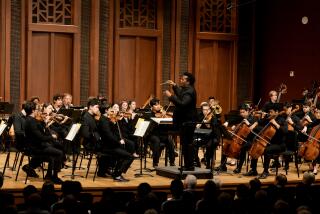Lancelot Pinard; Musician Brought Calypso to U.S.
- Share via
Lancelot Victor Pinard, who under the name Sir Lancelot was a significant figure in introducing calypso music to American audiences, died March 12 in Anaheim. He was 98.
Accompanying himself on guitar and singing old-time calypso tunes like “Rum and Coca-Cola,” “Mary Ann” and “Take Me, Take Me,” Pinard offered lively performances to packed houses at venues around Southern California in the 1940s and ‘50s.
Born in Cumuto, Trinidad, to well-to-do Anglophile parents, Pinard was educated in the West Indies and trained to be a pharmacist. He moved to New York City to pursue a medical career but switched to music after hearing a concert by a tenor named Roland Hayes. In an interview with The Times some years ago, Pinard recalled how he made the switch from classical music, which first captured his attention, to calypso.
“This orchestra leader from Trinidad who had a nice band in New York heard one of my concerts and said, ‘Would you condescend to record a couple of calypsos for me?’ ” Pinard said. “This is the music of my country,” Pinard replied. “I’d be proud to do it.”
Pinard’s performance debut as a calypso man came in 1940 at the New York club the Village Vanguard. That was quickly followed by a West Coast tour, which brought him to the Wilshire Ebell in Los Angeles. The critical response was positive and Pinard was quickly signed to appear in the 1941 film “Two Yanks in Trinidad.” He went on to make more than 15 other films, ranging from a role in the Bogart-Bacall classic “To Have and Have Not” to B films like “Zombies on Broadway.”
But Pinard’s success in America with calypso didn’t yield many dividends in his homeland.
“They have a whole British style down there and figured this is the music of the lower classes,” Pinard recalled. “Gentlemen didn’t sing calypsos at that time. I was the first, and when I went back . . . my friends did not receive me.”
But Pinard’s efforts helped legitimize calypso. He was popular throughout Europe in the 1960s.
A devout Roman Catholic, Pinard also wrote and recorded many “Gospel Calypsos” before he gave up singing in the early 1970s.
He emerged briefly in the 1980s, performing locally at McCabe’s Guitar Shop with a band composed of some legendary figures in the L.A. music scene: Van Dyke Parks on piano, Ry Cooder on guitar and Jim Keltner on drums.
“I had heard of him since I was a child,” Parks said some years ago. “This man is an innovator who did a lot to advance [his] music. I’ve met a lot of calypsonians who all gave reverence to Sir Lancelot.”
More to Read
The biggest entertainment stories
Get our big stories about Hollywood, film, television, music, arts, culture and more right in your inbox as soon as they publish.
You may occasionally receive promotional content from the Los Angeles Times.








